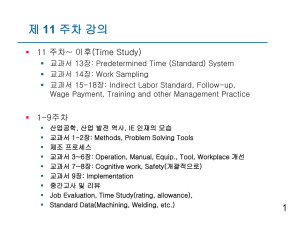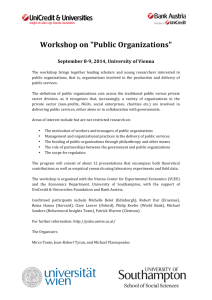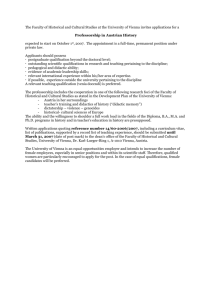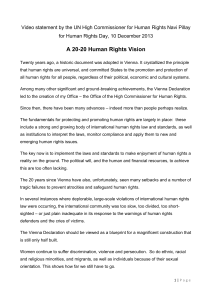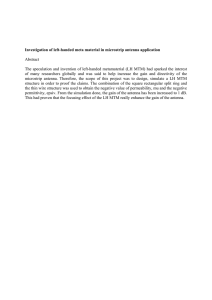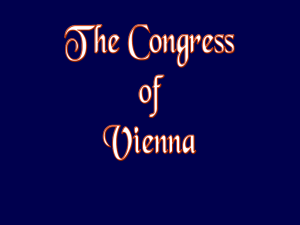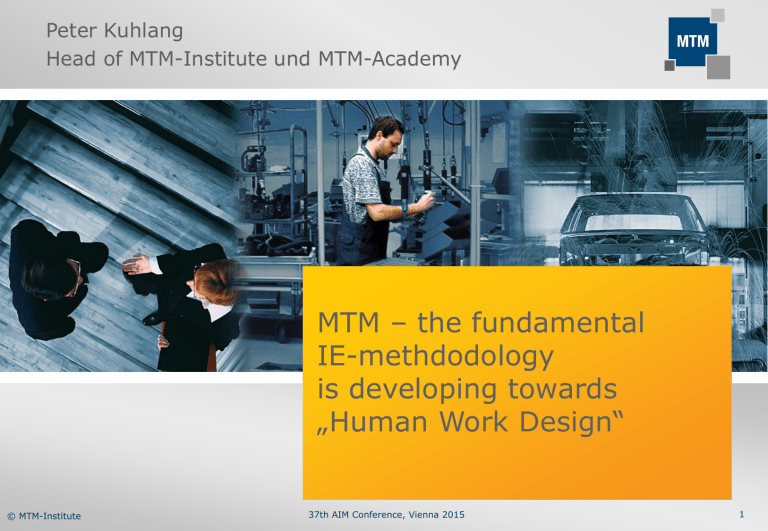
Peter Kuhlang Head of MTM-Institute und MTM-Academy MTM – the fundamental IE-methdodology is developing towards „Human Work Design“ © MTM-Institute 37th AIM Conference, Vienna 2015 1 Agenda • Introduce MTM and the International MTM-Directorate • New MTM approaches – Ergonomic Assessment Worksheet - EAWS – Human Work Design – MTM-HWD® • Further research activities © MTM-Institute 37th AIM Conference, Vienna 2015 2 Prof. Dr. Peter Kuhlang Academic career / personal facts • Head of MTM-Institute and MTM-Academy - since April 2014 • Technical Coordinator in the International MTM-Directorate • Associate Professor for Industrial Engineering @ Vienna University of Technology • Lectureships at universities such as Montanuniversity Leoben • Habilitation in the field of Industrial Engineering in June 2013 • Visiting Professor @ TU Dortmund University in 2012 • PhD in Technical Sciences @ VUT in 2000 Latest publication • Kuhlang, P (Hrsg.): Modellierung menschlicher Arbeit im Industrial Engineering Grundlagen, Praxiserfahrungen und Perspektiven, Stuttgart, Ergonomia, 2015. 267 S. © MTM-Institute 37th AIM Conference, Vienna 2015 3 The two dimensions of MTM MTM Methods-Time Measurement instrumental: methodology institutional: organization Avoiding waste in value stream Information stream Material stream Construction Organizational development Organizational planning Value added Planning Production Organizational sequence - Standard performance for human work - International standard to design, describe and evaluate human work - International process language © MTM-Institute 37th AIM Conference, Vienna 2015 - Associations (non-profit) - Training, int. certified - Consulting, Software 4 Global footprint of MTM Global presence – International MTM-Directorate Canada USA Brazil © MTM-Institute Norway Sweden Finland Denmark Great Britain Spain Netherlands Luxembourg Belgium France Portugal Slovakia Germany Switzerland Austria Poland Czech Republic Australia 37th AIM Conference, Vienna 2015 Hungary Turkey China Japan South Africa India 5 International standardised MTM-Systems Technical Plattform • Each system is under the responsibility of one NMTMA – Research and development – Maintenance of the training material Germany • • • Quantitative work design and measurement systems: MTM-1, MTM-2, UAS, MEK Quantitative workload measurement systems: EAWS Qualitative product design evaluation systems: ProKon © MTM-Institute 37th AIM Conference, Vienna 2015 6 How to apply MTM? Plan or observe operation Distance (cm) 0 ≤ 20 20 ≤ 50 50 ≤ 80 … … … … AF1 (40 TMU) AF2 (65 TMU) … … … HB1 (40 TMU) HB2 (60 TMU) HB3 (75 TMU) … … … Get and Place Start: Assemble connection plug to compressor and tighten it to torque. … Handle Aid … MTM-Datacard (exc. of MTM-UAS Basic Operations) AF3 (80 TMU) Choose process blocs and model operation x D Z 7 0 5 . 0 5 . . . 5 Assemble connection plug Finish: Modeled standard operation incl. standard time (285 TMU ≈ 10s) © MTM-Institute 1 2 3 4 5 6 Plug to thread Turn on Torque wrench 1. Turn 2.-3. Turn Turn to torque AF2 ZA2 HB2 ZA1 ZC1 ZD 65 15 60 5 30 20 1 5 1 1 2 1 65 75 60 5 60 20 Σ 285 37th AIM Conference, Vienna 2015 7 Modeling processes with MTM – as-is & in advance Worker 1 – door on cardboard No. 1. 2. 3. 4. Description Door on foldable cardboard Follow up Adjust Walk Code QxF tg AL 2 1 105 PA 3 AB 1 KA 1 1 5*2 25 25 25 Both workers – plug-in lug/flap No. Description Code QxF tg 1. Insert lug AB 2 2 45 2. 3. 4. Press lug in AA 1 ZD AA 2 2 2 2 20 20 25 Flip lug Extracts of the whole MTM analysis Distance (cm) 0 ≤ 20 20 ≤ 50 50 ≤ 80 Get and Place AF1 (40 TMU) AF2 (65 TMU) AF3 (80 TMU) Handle Aid HB1 (40 TMU) HB2 (60 TMU) HB3 (75 TMU) © MTM-Institute 37th AIM Conference, Vienna 2015 8 Time vs. method focus Work contet (time) Lean/CIP Systematic planning Combination: Increase of intensity and improvement of processes • Modeling of human work • Plan and explore the optimal human operating point t Imagination of a standard performance Restrictions Processes must exist • MTM provides a standard performance • Systematic modelling of processes based on process blocks • Develop and apply standard processes Current processes Focus : time © MTM-Institute Ideal Target processes Focus: (work) method 37th AIM Conference, Vienna 2015 9 Definition: MTM standard performance The standard performance of 100% is described within the LMS technique as being “the equivalent of the much-discussed fair day’s work. It was to represent an effort level that could be easily maintained year in and year out by the physically normal operator without in any way requiring him to draw upon his reserves of energy.” Quelle: Maynard, Stegemerten, Schwab, Methods-Time Measurement, McGraw-Hill, 1948 © MTM-Institute 37th AIM Conference, Vienna 2015 10 Development of MTM Building Block Systems Therbligs, predecessor of MTM-1 (1924) MTM-UAS Standard Operations (1988) ANA-ZEBA-DATA MTM analyzing software based on building blocks (1985) MTM-MEK Standard Operations (1983) © MTM-Institute TiCon® Process modeling and data management (as of 1997) Visual Inspection (1992) ProKon – ProductionOriented Design (1991) MTM-2 (1965) MTM-1, Methods-Time Measurement (Maynard, Stegemerten, Schwab 1948) Ergonomic Assessment Worksheet ergonomic analysis and assessment of processes (2010) MTMergonomics® integrated ergonomic process assessment (2008) MTM-Office-System (2001) MTM-Standard-Data (as of 1963) Foundation of the German MTM Association (1962) MTM-MEK MTM for One-of-kind and small batch production (1978) MTM-UAS Universal Analyzing System(1978) MTM-Office-Data (1972) today MTM-Office-System (2001) Human Work Design for the integrated time-related and ergonomic assessment of work processes (start of development in 2012) MTM as part of Productivity Management / MTM Concept (2012) ProKon A AutomationOriented Design (2014) 37th AIM Conference, Vienna 2015 11 Employees with impaired abilities Current Challenges – aging workforce Days of sick leave Days of sick leave, type of disease, age, 2013 1400 muscosceletal system cardiovascular system respiratory tracts injuries 1200 1000 800 600 400 psyche 200 digestion 0 Example: Employees with restrictions at an automotive manufacturer, 2010 35% 30% 25% 20% 10% overall workforce 16,9% 15% 8,5% 11,0% 5% 0% age group 23,5% 20-29 source: Badura (Ed.).Fehlzeiten-Report, 2014 worker with impaired abilities 30-39 40-49 50+ age group source: Keskin & Stork, 2010 increasing average age of workforce (in Europe) increasing share of work-related musculoskeletal disorders (WMSDs) with growing age increasing proportion of employees with impaired abilities with growing age ?What measures can be taken to design/to plan work places, minimizing the physical stress in order to enable productive and ergonomic work? © MTM-Institute 37th AIM Conference, Vienna 2015 12 EAWS – Ergonomic Assessment Worksheet Definition EAWS EAWS is an ergonomic 1st level tool for screening the risk due to biomechanical overload, developed to provide an overall risk evaluation that includes every biomechanical risk to which an operator may be exposed during a working task. • Up to a certain extent, EAWS can also be used as a 2nd level analysis tool, since it is quite analytical and detailed. • EAWS gives the necessary information to redesign the work task and to plan work systems in advance, making the second level systems seldom necessary. © MTM-Institute 37th AIM Conference, Vienna 2015 13 to International Standards and select Second level Tools Risk Areas CEN ISO Tools Correlated single systems (Second Level) Body Postures with low external effort 1005 - 4 11226 OWAS Action Forces 1005 - 3 11228-2 RULA Manual Material Handling 1005 - 2 11228-1 (Repositioning) NIOSH Upper Limbs - high frequencies / low loads OCRA, Strain Index, HAL-TV © MTM-Institute 1005 - 5 11228-3 37th AIM Conference, Vienna 2015 Combined systems (First Level) EAWS Standards AAWS EAWS compatibility 14 EAWS – form structure (paper&pencil, software) Page 1 (Section 0) Page 2 (Section 1) Page 3 (Section 2 and 3) Page 4 (Section 4) Header Overall evaluation Extra points Postures and movements Action forces Manual Material Handling Upper Limbs © MTM-Institute 37th AIM Conference, Vienna 2015 15 Evaluation of overall risc The EAWS sheet provides one score for each Macro-Section which is shown in a traffic light scheme (green, yellow, red) according to the Machinery Directive 2006/42/EC (EN 614). 0-25 Points >25-50 Points >50 Points © MTM-Institute Green Yellow Red Low risk recommended; no action is needed Possible risk not recommended; redesign if possible, otherwise take other measures to control the risk High risk to be avoided; action to lower the risk is necessary 37th AIM Conference, Vienna 2015 16 Process description & ergo. assessment – upto today Description (process steps) Method Ergonomics MTM-1, MTM-2, MTM-UAS, MTM-MEK Evaluation MTM time © MTM-Institute 37th AIM Conference, Vienna 2015 observed activity ergonomic assessment method 17 Process description & ergo. assessment – from today Method Description (process steps) Evaluation Ergonomics company-specific systems (e. g. EAWS) MTM time inherent © MTM-Institute 37th AIM Conference, Vienna 2015 18 Basic Pattern “Chronology” – „Modern Therbligs“ Chronology of Motion (rows in the description form) Chronology of Process (columns in the description form) © MTM-Institute HWD Actions Process Conditions Body movement Posture Head 37th AIM Conference, Vienna 2015 Arm Hand 19 Development of the Process Language MTM MTM-1 Process element/bl ocs Basic Motions • • Reach, Grasp, Move, Position, Release, Apply Preassure, Walk, Side Step,… Process time MTM-UAS Basic Operations • • Get and Place, Place, Handle Aid, Operate, ... Process Time MTM-HWD® Actions • • • Obtain, Deposit, Retract, Check, Apply Pressure, Move Leg Wait, Hold, Balance Purpose Datacard Formulas © MTM-Institute 37th AIM Conference, Vienna 2015 20 Thank you for your kind attention! Contact: ao. Univ.-Prof. Dr. Peter Kuhlang Instituts- und Akademieleiter © MTM-Institute Deutsche MTM-Vereinigung MTM-Institut | MTM-Akademie Eichenallee 11 15738 Zeuthen Deutschland 37th AIM Conference, Vienna 2015 Tel.: +49 33762 20 66-31 Fax: +49 33762 20 66-40 Mobil: +49 151 4225 1234 institut@dmtm.com www.dmtm.com 21
